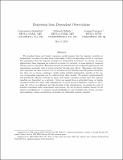Regression from dependent observations
Author(s)
Daskalakis, Constantinos; Dikkala, Sai Nishanth; Panageas, Ioannis
DownloadSubmitted version (485.5Kb)
Open Access Policy
Open Access Policy
Creative Commons Attribution-Noncommercial-Share Alike
Terms of use
Metadata
Show full item recordAbstract
The standard linear and logistic regression models assume that the response variables are independent, but share the same linear relationship to their corresponding vectors of covariates. The assumption that the response variables are independent is, however, too strong. In many applications, these responses are collected on nodes of a network, or some spatial or temporal domain, and are dependent. Examples abound in financial and meteorological applications, and dependencies naturally arise in social networks through peer effects. Regression with dependent responses has thus received a lot of attention in the Statistics and Economics literature, but there are no strong consistency results unless multiple independent samples of the vectors of dependent responses can be collected from these models. We present computationally and statistically efficient methods for linear and logistic regression models when the response variables are dependent on a network. Given one sample from a networked linear or logistic regression model and under mild assumptions, we prove strong consistency results for recovering the vector of coefficients and the strength of the dependencies, recovering the rates of standard regression under independent observations. We use projected gradient descent on the negative log-likelihood, or negative log-pseudolikelihood, and establish their strong convexity and consistency using concentration of measure for dependent random variables.
Date issued
2019-06Department
Massachusetts Institute of Technology. Department of Electrical Engineering and Computer Science; Massachusetts Institute of Technology. Computer Science and Artificial Intelligence LaboratoryJournal
Proceedings of the Annual ACM Symposium on Theory of Computing
Publisher
Association for Computing Machinery (ACM)
Citation
Daskalakis, Constantinos et al. "Regression from dependent observations." Proceedings of the Annual ACM Symposium on Theory of Computing, June 2019, Phoenix, Arizona, Association for Computing Machinery, June 2019. © 2019 The Author(s)
Version: Original manuscript
ISBN
978-1-4503-6705-9